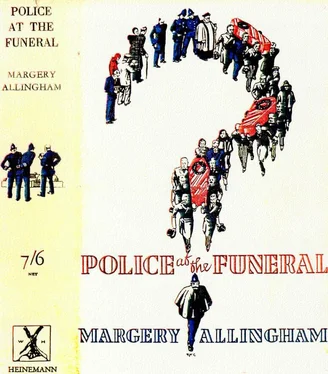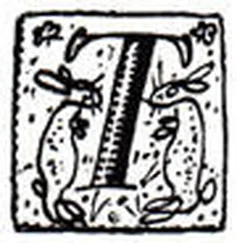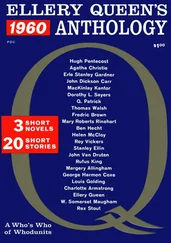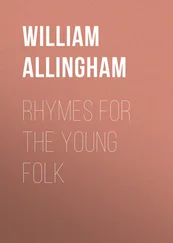Margery Allingham - Police at the Funeral
Здесь есть возможность читать онлайн «Margery Allingham - Police at the Funeral» весь текст электронной книги совершенно бесплатно (целиком полную версию без сокращений). В некоторых случаях можно слушать аудио, скачать через торрент в формате fb2 и присутствует краткое содержание. Жанр: Классический детектив, на английском языке. Описание произведения, (предисловие) а так же отзывы посетителей доступны на портале библиотеки ЛибКат.
- Название:Police at the Funeral
- Автор:
- Жанр:
- Год:неизвестен
- ISBN:нет данных
- Рейтинг книги:5 / 5. Голосов: 1
-
Избранное:Добавить в избранное
- Отзывы:
-
Ваша оценка:
- 100
- 1
- 2
- 3
- 4
- 5
Police at the Funeral: краткое содержание, описание и аннотация
Предлагаем к чтению аннотацию, описание, краткое содержание или предисловие (зависит от того, что написал сам автор книги «Police at the Funeral»). Если вы не нашли необходимую информацию о книге — напишите в комментариях, мы постараемся отыскать её.
Police at the Funeral — читать онлайн бесплатно полную книгу (весь текст) целиком
Ниже представлен текст книги, разбитый по страницам. Система сохранения места последней прочитанной страницы, позволяет с удобством читать онлайн бесплатно книгу «Police at the Funeral», без необходимости каждый раз заново искать на чём Вы остановились. Поставьте закладку, и сможете в любой момент перейти на страницу, на которой закончили чтение.
Интервал:
Закладка:
Margery Allingham
Police at the Funeral
To MY SEVEN PATERNAL UNCLES
This story, the characters in it, and the bridge in the Grantchester Meadows, are figments of the author's imagination, and have no reference to real incident, living people or topographical facts.
Chapter 1
'Here Lies a Benefactor'
When one man is following another, however discreet may be the pursuer or the pursued, the act does not often pass unnoticed in the streets of London.
There were at least four people who realized that Inspector Stanislaus Oates, only lately promoted to the Big Five, was being followed down High Holborn by the short, squat, shabby man who yet bore the elusive air of a forgotten culture about him.
The Inspector walked with his hands in the pockets of his raincoat, his collar turned up until it almost met the brim of his battered trilby. His shoulders were hunched, his feet were wet, and his very gait announced the dejection which he felt.
There was very little to show the casual passer-by that the square man, who might have been a bookmaker's tout, was following the Inspector. He himself would have been astounded to know that anyone had guessed that he was aware of the policeman's existence, but old Mrs Carter, who sells flowers outside the Provincial Bank, recognized Mr Oates and observed his trailer, and wondered what he was up to, aloud, to her daughter who was waiting for the 'late extra' Evening Standard van, and getting her high-heeled shoes full of water from the stream which was sweeping down the gutter.
The Commissionaire standing on the steps of the big Anglo-American hotel saw the two men also, and congratulated himself that nothing much escaped him. Old Todd, last cabby in the rank before Staple Inn, also made a note of the spectacle as he sat staring listlessly over his steel-rimmed glasses waiting for the evening rush, wondering if his one remaining brake would hold in this blasted rain.
And lastly, the Inspector himself was aware of the circumstance. One is not a policeman for twenty-five years without becoming peculiarly sensitive to the fact that one is not alone in one's promenading, and the silent companion at the discreet distance becomes as real as if he were at one's side.
Today the Inspector was aware of it and took no notice of it. There were many people who might have considered that they had sufficient grievance against him to meditate an attack on Mr Oates, but no one, so far as he knew, who would risk making such an attempt in broad daylight in the heart of the city. He squelched on, therefore, through the rain, lost in his own private depression. That lank, good-tempered man running to fat only at the stomach was oppressed by nothing more than a mild attack of dyspepsia coupled with the uncomfortable premonition that his luck was out and that something unpleasant was going to happen. His was not an imaginative nature, but a premonition is a premonition, and he had just joined the Big Five, so that his responsibilities, should anything difficult turn up, would be by no means decreased. Moreover, there was the rain, the dyspepsia which had sent him for the walk, and again the rain.
In the centre of the blinding storm which blew across the Viaduct he paused and upbraided himself. The vague presence behind him was his least irritant. Hang it! this rain was soaking him. He was out of the district of hotels, and thanks to the care of a grandmotherly government no public-house would be open for another hour and a half. His trouser legs were flapping clammily against his ankles, and in jerking up his raincoat collar he had spilt a small waterfall from his hat-brim down the back of his neck.
There were a thousand and one things he might have done. He could have taken a taxi back to the Yard or to some restaurant or hotel where he could have dried at leisure, but his mood was perverse, and he looked about him aggressively. The rawest constable on this beat, he reflected, must know of some shelter, some haven in this wilderness of offices where a man might dry, warm himself, and perhaps smoke a forbidden pipe in pleasant if dusty privacy.
London, like all great cities which have been built and rebuilt for upwards of a thousand years, has all sorts of odd corners, little forgotten patches of valuable land which still belong to the public, hidden though they are amid great stone masses of private property. Standing on the Viaduct, Stanislaus Oates cast his mind back over twenty years to the time when he himself had been a constable in London, raw from the provinces. Surely he had walked this dreary street on his way home from a Holborn beat: surely there had been some retreat where he had polished up the answers for the terrifying oral examination in the spring, or pencilled an absurdly glorified account of his doings to the trusting and lovely Marion still down in Dorset.
The buildings around him had changed, but the lie of the land was the same. Memory returned to him, patchily at first like a landscape seen through leaves, but suddenly he recollected a musty smell of warm sacks and hot water-pipes. And then it all came back to him--the dark passage-way with the shaft of light at the end, the red door in the wall with the bucket outside and the statue facing it.
Immediately his spirits rose considerably, and he set off, penetrating farther into the city until a sudden turning brought him face to face with a narrow archway squeezed in between two palatial wholesalers' doorways. The paving-stones within the passage were worn narrow strips set crazily together, and on the whitewashed wall was a small battered notice half obliterated by dust and further obscured by the shadow, which stated simply: ' To the Tomb .'
Down this alley Inspector Stanislaus Oates plunged without hesitation.
After some fifteen yards of tunnel he emerged into a little yard, the face of which had not altered since he had first known it, nor, for that matter, for the last hundred years. Here brown-black buildings rose steep on all four sides, framing a small patch of grey unfriendly sky. The reason for this peculiar airshaft in the very centre of an ancient block of buildings took up by far the larger half of the yard and consisted of a rectangle of sparse yellow grass surrounded by railings, in the midst of which reposed the stone effigy of a man in doublet and hose. A tablet at the figure's feet announced to the curious:
Sir Thomas Lillyput
He bought this land
His bones wherein to lie
Disturb him not lest ye be stirred
When ye shall come to die
Lord Mayor of London, 1537,and underneath, in more modern script:
Here lies a benefactor
Let no one move his bones.
The pious or perhaps superstitious magnates of a later London had so far respected Sir Thomas and his property that they had built their businesses around him and not directly above or beneath him.
The builder of the block above the passage, however, had utilized the yard as an entrance for coal since the strictly legal right-of-way was too narrow to admit of its use as a goods entrance, and the red door which the Inspector remembered on the right of the effigy led into the somewhat archaic heating arrangements of the ancient firm who occupied the east block.
The door was propped open by a bucket as it always had been. To the Inspector's livening eyes it appeared to be the same bucket, and he wondered if Old Foxie--the name came back to him with delightful familiarity--was still stoking. His depression was lifting at every step, and he advanced jauntily, restraining an absurd inclination to kick the pail as he passed into the semi-darkness of the furnace-room.
'And this, if I mistake not, Watson, is our client,' said a voice out of the glom. 'Good Heavens! The Force!'
Читать дальшеИнтервал:
Закладка:
Похожие книги на «Police at the Funeral»
Представляем Вашему вниманию похожие книги на «Police at the Funeral» списком для выбора. Мы отобрали схожую по названию и смыслу литературу в надежде предоставить читателям больше вариантов отыскать новые, интересные, ещё непрочитанные произведения.
Обсуждение, отзывы о книге «Police at the Funeral» и просто собственные мнения читателей. Оставьте ваши комментарии, напишите, что Вы думаете о произведении, его смысле или главных героях. Укажите что конкретно понравилось, а что нет, и почему Вы так считаете.











